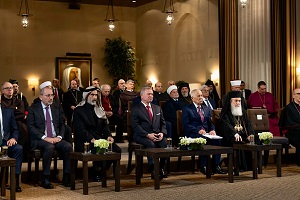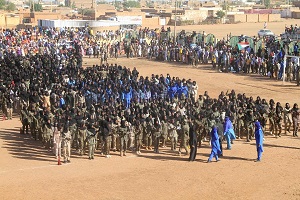The terror attacks in Ottawa mean that NSA-style surveillance could be coming to Canada much faster than anyone thought.
In the annals of Canadian history, the shooting death of a soldier and the wounding of three security personnel by a suspected Islamic terrorist this week may go down as the pivotal moment that allowed the country's spy services to expand their monitoring of Canadian citizens.
On Thursday, Prime Minister Stephen Harper addressed members in Canada's House of Commons, mere yards from where the gunman was shot dead by authorities the day before, and promised to push even harder for previously proposed enhancements to Canada's surveillance and detention laws for suspected terrorists.
The amendments would make it easier for Canada to monitor its citizens abroad and to share information with other countries' spy agencies, particularly the U.S. National Security Agency, which runs a vastly larger and more sophisticated intelligence-gathering apparatus than its counterpart to the north. The proposals have been hotly debated in Canada for the past week, and passage isn't a foregone conclusion. But the shooting may have given Harper's conservative government, which holds a majority of seats in parliament, the final push it needs to get them turned into law.
"This may be just the start of souped-up spy legislation, not the finish," said Colin Freeze, a reporter with the Globe and Mail who has written extensively about Canada's shadowy signals intelligence agency, the Communications Security Establishment Canada, which is the counterpart to the American NSA.
Public Safety Minister Steven Blaney announced to mixed reactions last week that the federal government planned to restore previously withdrawn surveillance powers and grant new ones to the Canadian Security Intelligence Service (CSIS), the country's main domestic intelligence agency. The proposed measures would prevent judges and lawyers from learning the identities of CSIS informants and would broaden the agency's ability to share intelligence with allies in the so-called Five Eyes group, which also includes the United States, Great Britain, Australia, and New Zealand. Previous attempts to expand surveillance have met stiff resistance from the country's opposition parties on civil liberties grounds. And lawmakers have been reluctant to allow intelligence sharing for fear it could lead to Canadians being arrested, detained, or killed by other governments, particularly the United States.
But in light of the shooting, as well as another attack this week in which a suspected Islamic radical drove his car into two Canadian soldiers, killing one, the proposals look to fall on more receptive ears in parliament. The members who may soon be voting on expanding the powers were among those hiding in their offices as the gunman ran through the halls of Canada's lawmaking body.
"The case for overt and formal cooperation with foreign governments is considerably easier this week than it was last week," said Gavin Cameron, a counterterrorism expert at the University of Calgary.
Prior to Wednesday's attack, the Harper government had also taken political heat for its deployment of special forces troops to Iraq and its decision to join the U.S.-led air campaign against Islamic State militants there. This week's violence, Cameron said, "has politically vindicated Harper's argument that Canada needs to take countering terrorism at home and abroad very seriously."
Neither accused terrorist has been definitely linked to the Islamic State, but Canadian officials have said they may have been inspired by the group to carry out attacks.
Neither accused terrorist has been definitely linked to the Islamic State, but Canadian officials have said they may have been inspired by the group to carry out attacks.
For years, Canada -- which has lived through more than a decade of Western anti-terror wars largely without domestic bloodshed -- has tightly restricted its intelligence services' ability to monitor citizens when they travel outside the country's borders, while making it harder for other governments to collect intelligence on Canadians.
But these restrictions have caused the intelligence services to lose track of Canadians overseas who have joined forces with terrorists and militant groups, officials say. "We had a black hole. We were unable to track where these people were, where they were moving, how they were moving," Andy Ellis, the assistant director of operations for the CSIS, said during a press conference last week.
An estimated 130 Canadians have left the country to join radical Islamist groups and an estimated 80 Canadians have returned home, Michel Coulombe, the director of the CSIS, told the Canadian parliament earlier this month. That's a significant number for a country of 35 million people. By comparison, FBI Director James Comey estimated that approximately 100 U.S. citizens have joined the Islamic State, out of a population of 316 million.
The Islamic State has made Canada one of its targets due to the country's role in the U.S.-led air campaign in Iraq and Syria. The group has also publicly urged its supporters to kill Canadians and carry out attacks on Canadian territory.
Both Michael Zehaf-Bibeau, the man suspected in Wednesday's shooting, and Martin Couture-Rouleau, who killed one Canadian soldier on Monday in Quebec, had previously tried to travel abroad but were stopped by authorities. Enhanced surveillance legislation wouldn't necessarily apply to cases like theirs, because the law governs overseas operations. But officials are still concerned that if they can't keep tabs on Canadians when they travel, they won't know enough about what they're planning and if they're communicating with those already in the country.
Other laws that allow for secret trials and pre-emptive detention may also see a resurrection in the wake of this week's attacks.
Other laws that allow for secret trials and pre-emptive detention may also see a resurrection in the wake of this week's attacks. Those provisions, contained in a 2001 anti-terrorism law, have been a major source of political friction since they expired in 2007. Since then, Harper and his Conservative Party have tried to restore the powers four times, but each time, a bill died in parliament after an election was called.
The Conservative Party managed to secure some provisions for arrests and secret hearings in a bill passed in 2013. But they weren't as robust as in the original law, and the government also failed to obtain the new surveillance and intelligence capabilities that are currently being proposed.
The intelligence services also experienced a setback in 2013, when a federal judge who had granted limited authority to monitor the communications of some Canadians abroad discovered that officials had been sharing the information with the United States and Britain, and relying on them to gather more intelligence. That collaboration was expressly forbidden, the judge said, to prevent other governments from detaining or harming Canadian citizens.
Officials have said ever since that as a result of the judge's ruling, they had to cease telecommunications surveillance of particular terrorism suspects overseas, leading them to lose track of individuals who could eventually pose a domestic terrorism threat. Changing the law now, to ensure that Canada's intelligence services can spy on suspected terrorists and get help from the NSA and other Five Eyes partners, means they "will be able to get back on the track we were before," Ellis said.
Latest News
-
 King receives Christian, Muslim religious leaders from Jerusalem, Jordan ahead of Christmas
King receives Christian, Muslim religious leaders from Jerusalem, Jordan ahead of Christmas
-
 Putin says Russia will 'certainly' achieve its goals in Ukraine
Putin says Russia will 'certainly' achieve its goals in Ukraine
-
 Sellami: Jordan target Arab Cup glory against ‘strong’ Moroccan side
Sellami: Jordan target Arab Cup glory against ‘strong’ Moroccan side
-
 RSF destroying evidence of atrocities in Sudan - report
RSF destroying evidence of atrocities in Sudan - report
-
 Defective used gas Heaters behind recent suffocation deaths — probe
Defective used gas Heaters behind recent suffocation deaths — probe